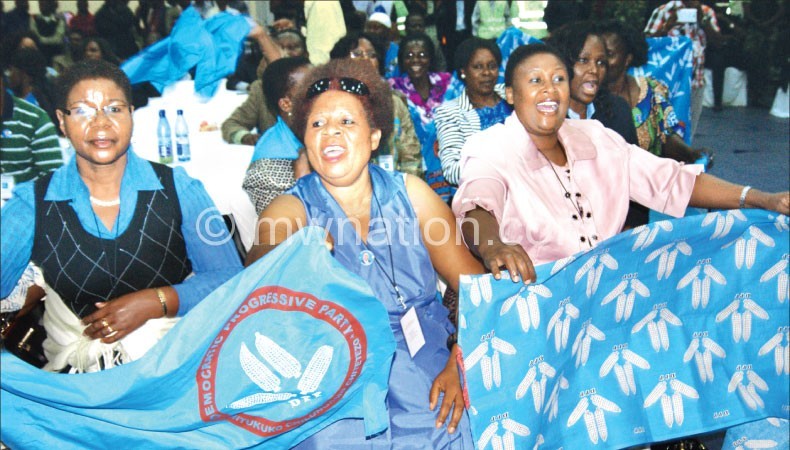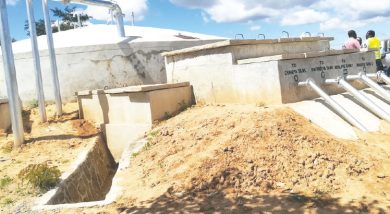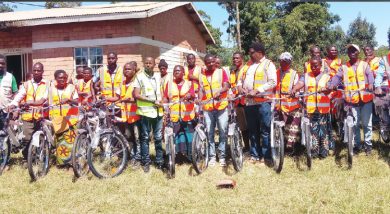8 days in the tally centre

The party’s supporters inside the Malawi Electoral Commission (MEC) Tally Centre punched the air. Some of them pounded their chests, which must, surely, have been, in that moment, thoroughly surprised about the wrongs they (chests) had committed to deserve the pounding.
Other supporters of the party just flapped the corners of their lips to let go a thunder of cheering. Some of these supporters just narrowed their lips and in one moment, unleashed a release of the most tearing of whistling. A few of them just freed from their eyes a flow of tears down the escarpments of their cheeks.
This is how members of the Democratic Progressive Party (DPP) inside the Comesa Hall, used as the tally centre, celebrated the declaration of their presidential candidate, Arthur Peter Mutharika, as one who had earned the tenancy of five years at State House as the country’s fifth President.
But they deserved their glee. For two years, as they wandered in the wilderness of circumstances, they must have been painfully wondering, why death, not an election loss, had snatched power from their clutch by taking away Bingu wa Mutharika, the leader of their party and more importantly to them, the President of the Republic.
As they jubilated, chanted out the name of the chairperson of the Malawi Electoral Commission: “[Maxon] Mbendera, Mbendera, Mbendera”, their People’s Party counterparts, the beneficiaries of Bingu’s death—because they went to power without testing an election—were crest-fallen. The dawning of the realisation that the sweetness of power, and all the trappings that go with it, had vanished,with such lightning speed.
It explains why loud hissing could be heard cutting through the cacophony of noise from some of the party members present. As Mbendera was being led by his security detail to his offices, after having just thrown the electoral gauntlet, the embittered members of the erstwhile ruling party chanted unprintable accusations behind him, all bordering on their feeling that the election had been robbed from them.
The fact that Malawi Congress Party (MCP) publicity secretary Jessie Kabwila walked like a wounded rhino, combing the parameters of the gigantic hall for anyone who looked like a journalist for a spontaneous interview, showed how the MEC announcement had awakened the vicious dogs that had all along been sleeping inside the independence winning party of Malawi. “What has happened is downright criminal,” declared Kabwila, when she chanced on the availability of the Weekend Nation news analyst.
It summed up the feeling in the MCP, a party that officially came second, for a record fourth time in post-dictatorship elections, but which still feels that its victory was sabotaged through a conspiracy of legal technicalities when the High Court refused to extend the window for dealing with election petitions from eight days, as stipulated by the law, to 30 days, as prayed by the party, to pave the way for its demand for a recount of the votes.
The reaction from the United Democratic Front (UDF) was like that of a rabbit that is caught, in the glare of floodlights, in the middle of nowhere. Before the official announcement of the results, the party members had formed ranks with MCP and PP, making protestations with a brave face despite unofficial results showing they were a distant fourth, and chances of them catching up would only have depended on an outlandish miracle.
The first evening in the tally centre did not begin with announcement of results as per the norm. It started with a profuse apology from the MEC chairperson. He was apologising for the mess that had interrupted voting in some centres due to late delivery of materials juxtaposed by acts of violence triggered by suspicion of rigging.
It meant the official announcements of results were not going to start on that day because MEC had decided to extend voting time by a day in the centres that had experienced disruptions.
The following day went, but the official results never came because, again, some centres had not yet voted. The reason given was that the local printer of ballot papers had failed to deliver on time.
Therefore, voting set a new record by entering into an unprecedented third day.
Meanwhile, the media started announcing the unofficial results right from the first evening of the polling day. Come the first morning after the polling day, each of the parallel tally centres of the four leading political parties —DPP, MCP, PP and UDF—claimed its candidate was running away with the poll. These claims continued as time went by despite the announcements from the media showing a clear pattern that only two candidates —Mutharika of DPP and Lazarus Chakwera of MCP —were leading.
When MEC announced that the tallying had reached 99.8 percent, but would have to wait to be directed by the High Court as to whether to announce the results or do the recount, anxieties were clearly taking their toll on everyone in the tally centre, especially the directly concerned political parties, notably DPP who were feeling their crowning was being unnecessarily delayed and MCP who kept toying with the idea that they still had a chance if only a recount took place. At the time, PP and UDF had visibly resigned to simply being cheer leaders for MCP.
Time was ticking. From 48 hours when MEC had made their announcement, time stood at 24 hours- before the expiry of the eight-day grace period after which MEC would been compelled by the law to announce the results —when the court process started, only to run into an immediate delay.
MCP asked presiding judge Healey Potani, and he granted their request, to step aside. Hours passed before another judge, Kenyatta Nyirenda, was identified. More hours lost when the new judge had to familiarise himself with the case. By the time court adjourned for that day, only preliminary matters had been dealt with. The time continued to tick.
The substantive hearing started on the morning of the deadline day. It meant that if the court did not rule by the time the eight-day window expired at midnight, MEC were, by operation of the law, going to announce the results. These were the most nervous moments!
The hours kept ticking away. People kept getting updates from the court. “Hearing is still continuing,” those at the court would respond through text messaging. More hours still passed. “The judge now is quizzing one of the lawyers,” another message from the court came. Almost 12 hours to the D-Time, yet another message, an assuring one – at least, came: “The judge has reserved his ruling until the time he will advise.”
Then at 9pm, three hours from the deadline, word swept across the Comesa hall. The judge had entered court to pronounce his judgment. He first removed the Jumbe injunction. The message about it in the hall excited the MCP and their allies—they punched the air and clashed their bottles of drink against each other. More excitement to them came with another message that the court had granted a recount. There were still and nervous faces in the DPP camp. Some 20 minutes passed. No word from the court. Ten more minutes elapsed. Rumour started. Then more rumour. Then confirmation. The court had refused to extend the time.
Two types of sighs were heaved. One of relief in the DPP camp. One of regret and defeat in the MCP territory.
The announcement, an hour later, did not just release the results; it freed some from the bondage of spending their days and nights in the tally centre, throughout. n





